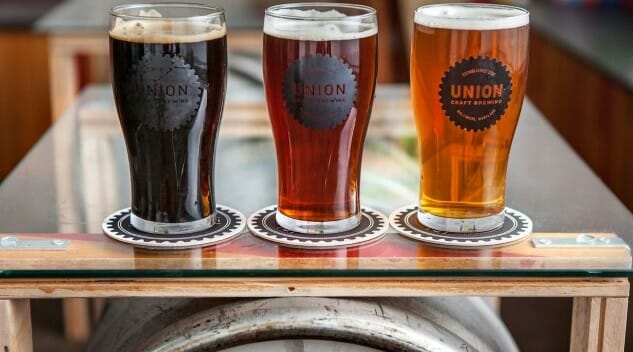Maryland Is Doing its Best to Destroy its Craft Beer Industry For Good This Month
Photos courtesy of Union Craft Brewing
Back in April of 2017, we wrote about how Maryland had just finished attempting to screw the state’s craft brewers via a new piece of legislation known as House Bill 1283. Introduced in secret and hidden from the state’s brewers until it had already passed the House of Delegates, the bill was amended in the state Senate thanks to a last-ditch effort by craft beer activists. These amendments managed to alter its affects from “devastating” to merely “complicated and imbalanced.” On one hand, HB 1283 gave breweries something they wanted—the ability to sell more beer to the public directly from their taprooms. But on the other hand, it introduced a patently unfair “grandfathering” system, in which already existing breweries would be held to one legal standard in terms of hours of operation, but new breweries would be punished with reduced hours of operation for their audacity in wanting to open a new small business.
Why did this happen? Well, in a single sentence: It happened because state legislators were more interested in courting big business than serving their local breweries. Specifically, it happened to make Maryland the most attractive possible home for Diageo’s destination Guinness brewery, despite the fact that Diageo as a company has largely sided with the craft brewers against the state of Maryland. That’s right: Even though Diageo isn’t asking Maryland legislators to screw over the state’s craft brewers on their behalf, they’ve elected to do so anyway, while crafting legislation that exempts the Guinness brewery (and no one else) from additional regulation.
Enter, HB 518 and HB 1052—dueling house bills that will determine the future of the state’s brewing industry, both of which will be heard by Maryland’s House Economic Matters Committee on Feb. 23. One (HB 518) is supported by the state’s craft brewers (and apparently Diageo as well), and is aimed at loosening restrictions on beer sales, and modernizing the state’s beer laws to be similar to other states that have made craft beer into a major tourism driver. The other bill, HB 1052, is supported by the state’s most powerful alcohol distributorships, and the lobbying/campaign contribution power they wield. This is perhaps a relevant time to point out a few of the corruption scandals that have wracked Maryland’s legislative body in the last few years.
“HB1052 would inflict actual harm on a majority of the brewing industry,” said Kevin Atticks, executive director of the Brewers Association of Maryland, in an interview with Baltimore Magazine. “Rather than wasting our time and energy debating a tone-deaf, mal-intentioned attempt to distract from real conversations aimed to grow our manufacturing industry, we’re focusing on our legitimate, reasonable, reform efforts.”
ALERT: HB518, the #ReformOnTap Act and #HB1052 will be heard by a House committee on Friday, 2/23. Join us and show your support for Maryland Brewers! If you can’t attend but wish to submit written testimony, please email me at [email protected]. pic.twitter.com/SMCG43213b
— Peter Franchot (@peterfranchot) February 9, 2018
Let’s compare the contents of the two bills via direct bullet points. HB 518, favored by the craft brewers, would do the following:
– Remove all limits on beer production, taproom sales and take-home sales;
– Repeal the “buy-back” provision that requires brewers to purchase their beer from distributors at a marked-up cost if they exceed the 2,000-barrel limit on taproom sales;
– Lift unnecessary restrictions for take-home sales;
– Let local jurisdictions set guidelines for taproom operating hours;
– Allow smaller brewers to self-distribute;
– Remove restrictions on contract brewing that inhibits start-up businesses.
Meanwhile, HB 1052, which Diageo/Guinness directly says they do not support, would do the following:
– Reduce the amount of annual taproom sales allowed from 2,000 to only 500 barrels, with the sole exception of Guinness (because this is clearly fair);
– Directly prohibit contract brewing of any kind;
– Restrict sample sizes at all breweries to only “three ounces per style or brand.”
In a supreme act of irony, the introduction of HB 1052 came right after Maryland Governor Larry Hogan declared this month “FeBREWary” in the state, a month for “Maryland Craft Beer Lovers.”
-

-

-

-

-

-

-

-

-

-

-

-

-

-

-

-

-

-

-

-

-

-

-

-

-

-

-

-

-

-

-

-

-

-

-

-

-

-

-

-

 Photo via Getty Images, Ilya S. Savenok
Photo via Getty Images, Ilya S. Savenok







































